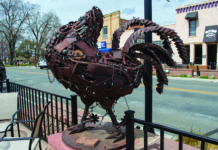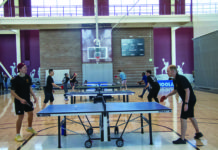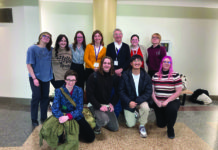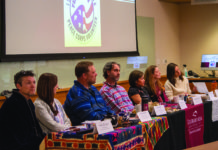“I feel tremendously honored but I also feel like it’s important to acknowledge that I think that science communication and science outreach and Cascades is just a really inherently collaborative discipline,” Dr. Johanna Varner, assistant professor at Colorado Mesa University said in response to her award.
Varner has received a great award in the world of science. She has been awarded the 2018 Early Career Award for Public Engagement with Science by the American Association for the Advancement of Science (AAAS).
Varner applied for this award last year. She wrote a candidate statement and then there also has to be letters of nomination.
“I asked one of my mentors in Utah last year and I was selected as a finalist but not as the winner,” Varner said. “This year she encouraged me, I wasn’t going to do it actually and she encouraged me to apply for it again and I got it.”
This award was given to Varner for many of her different career aspects. Not only for her career interest in the Pika mammals, but her involvement in science outreach.
“I liked them [Pikas] growing up and learned about them on a nature TV show,” Varner said.
Varner was a molecular biology student and did her masters in that. After she got her masters she took some time off after because she needed some time after all that schooling. She went to New Zealand and did some backpacking and soul-searching and when she came back she was working at a bakery and read an article about a woman who was a biology professor at the University of Utah and had done her PhD.
“I was like wait a minute I could do science and have it be on these animals that I love in the places that I like to go?”
“And so I sent her an email interested and we talked for a while,” Varner said. “She needed a technician in her lab so she offered me a position as the lab manager. About a year and a half of working with her as a lab manager the money for the project ran out and she encouraged me to apply for graduate schools. I applied for graduate school in her lab and that’s when I actually started working.”
Varner is part of the co-founding group of the Cascades Pika.
“It was cofounded by a number of people. There is a biologist from the US Fish and Wildlife Services, the Oregon zoo, a biologist from USGS and there were a couple of nonprofit groups that were a part of that as well,” Varner said. “When that project got started I was looking at kind of doing the same thing trying to get us involved in monitoring Pikas and turned out that a lot of other people are thinking along the lines and so a number of us got together for a meeting at the Oregon Zoo to discuss those option and then projects.”
Along with Varner’s work with Cascades Pika, there were other reasons that made her the perfect choice for this award. She reaches out to those who are underserved audiences.
“Most of the time when we do a public outreach for science we go and give a talk at a library or we give talk at the nature center. And the people who come to those talks are typically people who already know about science and they already care about science and they want more science,” Varner explained. “But there are people that I feel like scientist don’t necessarily reach out to and if we don’t reach out to them and they don’t get that interaction.”
Varner took part in a program where scientists go and give presentations at the county jail in Salt Lake. One of her mentors at the University of Utah had established this.

“I went that one time and I talked about Pikas at the jail,” Varner said. “It was really different, but I was surprised I was very surprised at how engaged and interested the inmates were. They were really interested in hearing about science and had really good questions and they all had really thoughtful responses to my questions.”
She enjoys teaching non major biology classes at CMU.
“I think that in some ways, non-major biology classes is a lot like science engagement and average work because the whole group of 65 to 80 students that aren’t science majors, they aren’t necessarily very excited about science, and that’s one of my biggest goals,” Varner said.
Another aspect to Varner’s teaching is her ability and goal of infusing media and science. She had an internship with a radio station as part of a the Mass Media Fellowship by AAA. She was placed at a radio station in San Francisco.
“They basically fund you to be a science journalist for the summer,” Varner said. “I think the experience there was really fun because I got to try a lot of different things. I got a chance to be a part of video production and to help out with web news and radio stories and you’re doing different kinds of things.”
Before her internship she was already trying to mix media and science with public outreach and interactive presentations. She also took a class in filmmaking for scientists and worked with some filmmakers. She thinks that media and science work together.
“I already kind of infuse that into a lot of my classes for example in some of my upper division classes the students have to make videos,” Varner said. “I would definitely be interested in having a class that was more devoted to science communication.”
Varner has opportunities like starting a science communication class at CMU.
“A couple things I really like about CMU is that I still get to go into the field and work with students today,” Varner said.
This past summer, Varner worked with an undergraduate, Brooke Waterhouse, who is a biology major, on researching different kinds of mountain ranges and their Pika populations. Waterhouse presented that work in August. Varner continues to interest other students in Pikas and although she may be in Colorado, she still keeps in touch with Cascades Pika in Oregon.

“I still have a lot of contact with those people, we are trying to get some funding because most of the River Gorge burned up in a massive wildfire and we are trying to get some help in mobilizing just to be able to help us find out how the Pikas are doing,” Varner said.
The difficulty of being in one place and also trying to manage another is time and travel money.
“It’s expensive to get out there and I don’t have much time during the semester. But I think I’m going to try to make a priority to get back out there,” Varner said.
Varner’s many attributes to the science world has made her the receivant of the Early Career Award for Public Engagement with Science. The AAAS only gives out two awards. One is the early career and one is for those who are later in their careers.
Varner received her award in Texas on Feb. 17. As much as she feels honored, she also believes that communication and science are collaborative and many others have been apart of her journey.
“I’ve been really well supported by the community and they really should also be celebrated,” Varner said. “I also really want to acknowledge that I had a lot of help and support from my mentors in graduate school that were like yes we think that going out and working with kids and doing science outreach is important and valuable.”





